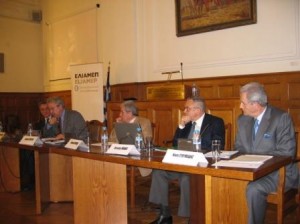 The Hellenic Foundation for European and Foreign Policy (ELIAMEP), on the occasion of its 20th anniversary organized on the 18th of December 2008 in Thessaloniki a Roundtable Discussion on “Globalisation, Europe and Greece”, in collaboration with the Aristotle University of Thessaloniki and the University of Macedonia. Professor Anastasios Manthos, Rector of the Aristotle University and Professor Ilias Kouskouvelis, Rector of the University of Macedonia delivered the opening remarks.
The Hellenic Foundation for European and Foreign Policy (ELIAMEP), on the occasion of its 20th anniversary organized on the 18th of December 2008 in Thessaloniki a Roundtable Discussion on “Globalisation, Europe and Greece”, in collaboration with the Aristotle University of Thessaloniki and the University of Macedonia. Professor Anastasios Manthos, Rector of the Aristotle University and Professor Ilias Kouskouvelis, Rector of the University of Macedonia delivered the opening remarks.
Professor Loukas Tsoukalis, President of the Board of the Directors of ELIAMEP, gave an introductory speech entitled ‘The battle of the ideas and the role of ELIAMEP’. In his speech Professor Tsoukalis argued that Greece has been going through a process of adjustment in a rapidly changing european and international environment, not always without pain or difficulty. ELIAMEP strives to keep a window open to the outside world, while also playing an active role in the battle of ideas at the European level.
Professor Anthony Molho of the European University Institute in Florence commenced his speech on globalization by rejecting the idea that globalization is only about the present and the future. He underlined its historical aspects, as well. It has exercised deep influence on the course of human history. To support his argument, he gave three examples of primitive or fundamental globalization, beginning from 3.000 B.C. to some centuries ago. The first example was the use of the bow and the arrow, a system of advanced military technology that was adopted by the whole world. He also spoke about the use of a common numerical system, which was invented in the 7th century A.D. and within a century was used in Bagdad, in Eastern Mediterranean and the whole of Europe. The third example was the use of tobacco; primarily used by the Indians for medical and recreational purposes but after a few years its popularity overcame the popularity of chocolate, tomato and potato in Europe.
Professor Molho concluded by pointing out that globalization is a fluxionary, long-term phenomenon, whose beginning coincides with that of the mankind.
According to Professor Couloumbis, Vice-President of the Board of Directors of ELIAMEP, globalization works like a knife. It can kill as much as it can save a life. We have reached a critical point where we have to manage the negative consequences of globalization and take advantage of the positive ones. It is certain that the crisis we experience will lead us to a total reformulation of the international economic and eventually political system. The essence of globalization was balanced with ‘laissez-faire’. However, he concluded that due to the current depression, the market could not heal itself. The gap between the wealthy and the middle class has increased significantly, raising the inequity in the developing countries. Unfortunately, the traditional measures to fix the situation are losing their effectiveness. Therefore, we experience a governmental intervention through states or an intergovernmental one through IMF, WTO and World Bank. In order to balance the market, we need globalization: A globalization of constant negotiations, mutual exchange of information, construction and upgrading of effective international institutions. In other words, we need more democracy.
Professor Ioannis Voulgaris from Panteion University, Athens, focused more on Greece and globalization. He asserted that we are experiencing the first major crisis of modern globalization and we have experienced the impact in all of its aspects: financial, energy, environmental, social. Globalization is a long-historic procedure, and it is neither linear nor irreversible. The centers of globalization have moved from Amsterdam in the 17th century to London in the 18th -19th centuries and finally to New York in the 20th century. The hierarchies of states vary; some lose whereas others gain. Greece’s course was fairly good from the beginning of the 19th century onwards. Globalization has signaled a deep change in the Greek society and politics. The question here lies on how Greece will be able to adjust, to be incorporated in the new dynamics of global capitalism. Professor Voulgaris stressed four changes that occurred during the last years. The first change is on multi-level governance and multi-centric systems of power with geographical reference either the whole world or primarily the European Union. The second change has to do with the transformation of the structure of capital accumulation characterized by the peripheral organization in South-east Europe. Thirdly, new class and social connections of production are beginning to appear and finally, the last change is on the formation of identity. Greece has managed to follow the important changes in history, the big transformations in the group of the advanced European states. We can put it somehow like this: “Greece always travels with the best and fastest train there is, but she is a passenger in the last wagon that always arrives late and barely makes it on time”, Professor Voulgaris concluded.
Mr. Nikos Efthymiadis, President of REDESTOS Efthymiadis Agrotechnology Group and former President of the Federation of Industries of Northern Greece, moderated the ensuing discussion.
Event
|
Globalisation, Europe and Greece

Upcoming Events
Policy discussion on: "The New Pact on Migration and Asylum: Perspectives from Germany & Greece"
April 24, 2024
Open discussion: 'European Pathways of Sustainability, Sustainable Development in Syros.'
April 29, 2024
4th ELIAMEP – ACG Summer Academy: Bridging Perspectives: Training Young Leaders Across the Mediterranean
July 1, 2024 - July 6, 2024


